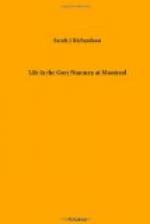Immediately on our arrival a part of our number were set to work in the fields, while the rest were kept in the house to assist the women. I hoped that I might be one of these last, but disappointment was again my lot. I was sent to the field with the others, and set to reaping; a priest being stationed near, to guard us and oversee our work. We were watched very closely, one priest having charge of two nuns, for whose safe keeping he was responsible. Here we labored until the harvest was all gathered in. I dug potatoes, cut up corn and husked it, gathered apples, and did all kinds of work that is usually done by men in the fall of the year. Yet I was never allowed to wear a bonnet on my head, or anything to shield me from the piercing rays of the sun. Some days the heat was almost intolerable, and my cap was not the least protection, but they allowed me no other covering.
In consequence of this exposure, my head soon became the seat of severe neuralgic pain, which caused me at times to linger over my work. But this was not permitted. My movements were immediately quickened, for the work must be done notwithstanding the severe pain. Every command must be obeyed whatever the result.
At night a part of our number were taken to the nunnery, and the rest of us locked up in our rooms in the house. We were not permitted to take our meals with the two housekeepers, but a table was set for us in another room. One would think that when gathering the fruit we would be allowed to partake of it, or at least to taste it. But this was not allowed; and as a priest’s eye was ever upon us, we dare not disobey, however much we might wish to do so. I used to wonder if the two women who kept the house were as severely dealt with as we were, but had no means whereby to satisfy my curiosity. They were not allowed to converse with us, and we might not speak to them, or even look them in the face. Here, as at the nunnery, we were obliged to walk with the head bent forward a little, the eyes fixed on the floor, one hand, if disengaged, under the cape, the other down by the side, and on no occasion might we look a person in the face. The two women seemed to be governed by the same rules that we were, and subject to the same masters. I used to think a great deal about them, and longed to know their history. They wore blue dresses, with white caps, and white handkerchiefs on their necks. Their life, I think, was a hard one.




